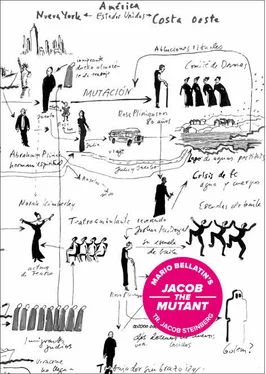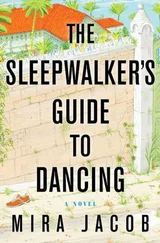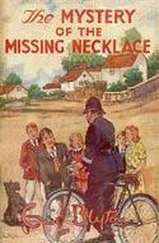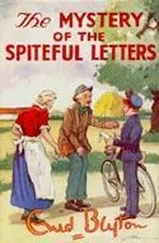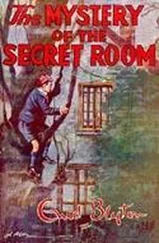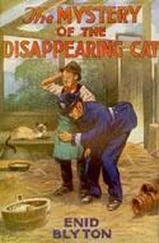Mario Bellatin - Jacob the Mutant
Здесь есть возможность читать онлайн «Mario Bellatin - Jacob the Mutant» весь текст электронной книги совершенно бесплатно (целиком полную версию без сокращений). В некоторых случаях можно слушать аудио, скачать через торрент в формате fb2 и присутствует краткое содержание. Год выпуска: 2015, Издательство: Phoneme Media, Жанр: Современная проза, на английском языке. Описание произведения, (предисловие) а так же отзывы посетителей доступны на портале библиотеки ЛибКат.
- Название:Jacob the Mutant
- Автор:
- Издательство:Phoneme Media
- Жанр:
- Год:2015
- ISBN:нет данных
- Рейтинг книги:3 / 5. Голосов: 1
-
Избранное:Добавить в избранное
- Отзывы:
-
Ваша оценка:
- 60
- 1
- 2
- 3
- 4
- 5
Jacob the Mutant: краткое содержание, описание и аннотация
Предлагаем к чтению аннотацию, описание, краткое содержание или предисловие (зависит от того, что написал сам автор книги «Jacob the Mutant»). Если вы не нашли необходимую информацию о книге — напишите в комментариях, мы постараемся отыскать её.
is a novella in a perpetual state of transformation — a story about a man named Jacob, an ersatz rabbi and owner of a roadside tavern. But when reality shifts, so does Jacob, mutating into another person entirely.
Jacob the Mutant — читать онлайн бесплатно полную книгу (весь текст) целиком
Ниже представлен текст книги, разбитый по страницам. Система сохранения места последней прочитанной страницы, позволяет с удобством читать онлайн бесплатно книгу «Jacob the Mutant», без необходимости каждый раз заново искать на чём Вы остановились. Поставьте закладку, и сможете в любой момент перейти на страницу, на которой закончили чтение.
Интервал:
Закладка:
Mario Bellatin
Jacob the Mutant
The Wait
The forms remained in suspense. The men’s skin perpetually wet. A golem. A dozen boiled eggs. No mutation was produced. All that appeared was the image of some sheep grazing among rocks.
The Border
Jacob Pliniak is presented to the reader as one of the simplest beings in the world. Considered a rabbi in his small community, he dedicates a good part of his day to teaching Scripture to the village families’ children. He is married to Julia and together they own a tavern called The Border. The young Anselm helps them with their tasks. The days are hectic. Jacob Pliniak rises at dawn. Following the ritual prayers, and his baths — fully clothed and with cold water, as if a personal penance — he awaits the arrival of his pupils, who enter the shed out back in silence. Just shortly prior, the bustle in the tavern has come to a close. Many of those present — soldiers and peasants in flight, or women, for the most part, of unknown origin — sleep among the tables, a sleep provoked by the excesses of the night. Julia and the young Anselm have managed the tavern until early morning. They’ve been attentive to the guests all the while trying their best not to meddle with their conduct. Julia has gone to sleep at daybreak, in the bed that Jacob Pliniak has just left. The wife will not get up until noontime. Before drifting to sleep, making out the sounds of Jacob Pliniak’s bath, Julia tends to wonder about that very peculiar way in which her husband does penance. She likewise asks herself why he has never been taken for a legitimate rabbi. In reality, he was not a rabbi in the full sense of the word. If he were, his wife would not be allowed to manage the tavern, even less so until the early morning hours. The Border was perhaps one of the least known works of the Austrian writer Joseph Roth. A complete translation has yet to surface, although fragments have shown up, like the lines offered above, in specialty magazines in Paris and on the West Coast of the States. The Stroemfeld publishing house in Frankfurt holds an old edition in its archives that is believed to be complete, while the independent publishing house Kiepenheuer & Witsch has another version that, many hold, is just composed of a series of fragments. Nobody knows why, but to this day neither of the two has been published. Many exegetes assert that a more thorough investigation has yet to be carried out, one that would allow the compilation of the immense quantity of papers dispersed about that are thought to compose the book in its totality. It is not known what Joseph Roth thought of this novel. Given that he never finished it, he did not live to see it published. One of the women who accompanied him in his final years — an English investigator based out of Paris — insists that the writer never parted from the text, and that he always went about writing it in a state of complete inebriation. In some way, it seems to be the novel whose editing he reserved for those moments when he was intoxicated. It is a curious fact that, according to the testimony of that very investigator, when he was creating The Legend of the Holy Drinker and other texts directly related to alcohol, he would not allow even a pint of beer in his presence while he wrote. That is why this text, The Border , may be considered a type of treatise created through the author’s unconscious. There is nobody in the small county of Korsiakov who does not know Jacob Pliniak’s tavern , says one of the book’s beginnings. They all know that, through its only window, it is possible to take in the panorama that spans from the town center, with the towers of that strange, mysterious castle in the background, to the small hut that serves as a border marker. On summer days, as in winter, one can see the hut lit up at night with a faint yellow light — a light that constantly seems to grow closer and then distant — transforming the border into a point of deceptive existence, the author indicates in another of the text’s openings. Both beginnings seem to have been written during Joseph Roth’s younger years, when he hadn’t yet abandoned his native Galicia. Nevertheless, it would be hasty to consider this text a developmental work, given that, in a certain way, the same narrative lines found in this novel mark his later works as well. There is also the fact that it is a text that the author never stopped writing. For some, Jacob Pliniak’s plot takes on an exceedingly basic tone. They think it merely has to do with the story of a shopkeeper, the owner of a border town tavern. The tavern, in reality, is only a cover for an escape route for scores of Jews fleeing the Russian pogroms. Those readers don’t seem to pay heed to the adventures that Jacob Pliniak will take part in years later in America, at which point he will even transform into an elderly woman: the pious Rose Plinianson. But getting back to the beginnings, the calm in Jacob Pliniak’s life — represented mainly by the religion classes he holds for the children in the region and his weekly incursions to a certain spot on the border to help his religious companions across — is visibly altered (in a definitive way, as will be seen later) when he discovers that Julia, his wife, is the young Anselm’s lover. Moreover, the two of them have planned to run away together. When Jacob Pliniak finds out about the incident, guided by the paths left deliberately by his own wife, he feigns ignorance of the relationship. He remains silent, and every morning he faces the breakfast his wife prepares for him before she heads off to sleep alone. A cup of borscht on the table and a teapot placed on the stove is what Jacob Pliniak is accustomed to finding day after day upon waking. On certain occasions he also finds a sandwich made with smoked herring, surely brought from the Baltic the night before by some traveler. Joseph Roth, in his role as creator, goes about pointing out different realities as he proceeds forward with his writing. Perhaps this task is most clearly seen in The Border . That could possibly be the reason why it is one of the author’s most cryptic and structurally complex works. Maybe that is also why the character, Jacob Pliniak, who in the middle of the narrative transforms into a woman like in Virginia Woolf’s Orlando , is one of the most curious characters in literary history. There is no doubt that he is, at the very least, the strangest character thought up by our author. Some believe that he is a character who is not entirely complete — that he more so served the author as an inspiration for the construction of other, more complete heroes like the memorable Isaac in Job , the shopkeeper Nissen in The Leviathan , or the inspector Anschelbum, famous for his zeal in controlling the region’s weights and measures. Others think that he is, definitively, an innovation of what was traditionally known as a character. This appreciation can be taken on more clearly by seeing how Jacob Pliniak manages to get the Russian Jews from one side of the border to the other. Thursday is set aside for bringing the exodus to fruition. On those days he does not wait for the students’ arrival at his house for study. The people in the surrounding areas know that, apart from the traditional Sabbath, Thursdays have also been set aside as a type of holy day. At dusk Jacob Pliniak makes his way to a point on the border that no one else knows, situated at the ford of a less-than-plentiful river, where he crosses without removing his clothes. The issue of the waters and the clothing forms a part of his personal ritual. According to Jacob Pliniak, each time that somebody bathes with clothes on he is repeating his communion with God.
Читать дальшеИнтервал:
Закладка:
Похожие книги на «Jacob the Mutant»
Представляем Вашему вниманию похожие книги на «Jacob the Mutant» списком для выбора. Мы отобрали схожую по названию и смыслу литературу в надежде предоставить читателям больше вариантов отыскать новые, интересные, ещё непрочитанные произведения.
Обсуждение, отзывы о книге «Jacob the Mutant» и просто собственные мнения читателей. Оставьте ваши комментарии, напишите, что Вы думаете о произведении, его смысле или главных героях. Укажите что конкретно понравилось, а что нет, и почему Вы так считаете.
